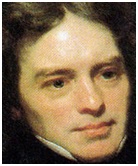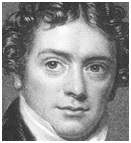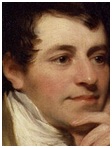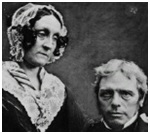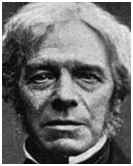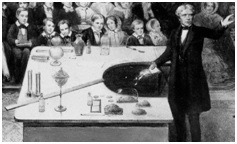|
 |
|
 |
|
|
||
Michael Faraday - Creativity and Science
Michael Faraday (1791-1867)
English scientist (pictured right). The first person to generate electricity from a magnet. Invented the first electric motor and dynamo and discovered the laws of electrolysis.
Why was he so creative? 1. Determination Faraday (pictured right in his early 30's) came from a poor background, left school at 13 and became a bookbinder’s apprentice in 1805. But he was determined to become a scientist after:
2. Purpose His work was driven by his Christian beliefs, which were even more important to him than science. He belonged to a church, which strictly followed Jesus’s principles of love and humility. This is why he refused a knighthood. 3. Love of learning His continual thirst for knowledge made him eager to learn from other brilliant scientists The English chemist, Humphry Davy (pictured right) gave him a job at the Royal Institution as his laboratory assistant in 1830.
4. Family support He was helped by his:
5. Experimenting He is often known as the great experimenter, because all his discoveries were made from endless experiments in his laboratory. He had marvellous ingenuity and imagination, which gave him the ability to try lots of different things before proving something. 6. Revolutionary Faraday (pictured right c1861) was always prepared to challenge existing knowledge. For example, he disproved the generally held view that electricity was a fluid that flowed through wires like water through a pipe. He also made electrical equipment possible by his revolutionary discovery of power generated by electrical and magnetic fields.
7. Health and hard work He pushed himself very hard during his successful experiments from 1831 to 1839. But then his health broke down, and he did nothing very creative for six years. His church was always very important to his mental health.
8. Curiosity Faraday loved new ideas and had an extremely curious mind.
9. Passion He had a fiery temperament but the self-discipline to convert that passion into something positive and useful.
10. Mass appeal Faraday was:
He worked at the Royal Institution in London where he began the Christmas lectures for children in 1826 (pictured right is his 1856 lecture). His lectures were fascinating and entertained many people including the writer, Charles Dickens (pictured right).
Key quotes on creativity But still try, for who knows what is possible. Without experiment I am nothing.
Key quote on the learning organization I believe some hesitate because they do not like their thoughts disturbed. |
|
|
||
|
|
||
| Copyright © wisdomtowin.com 2025 All Rights Reserved | ||
|


